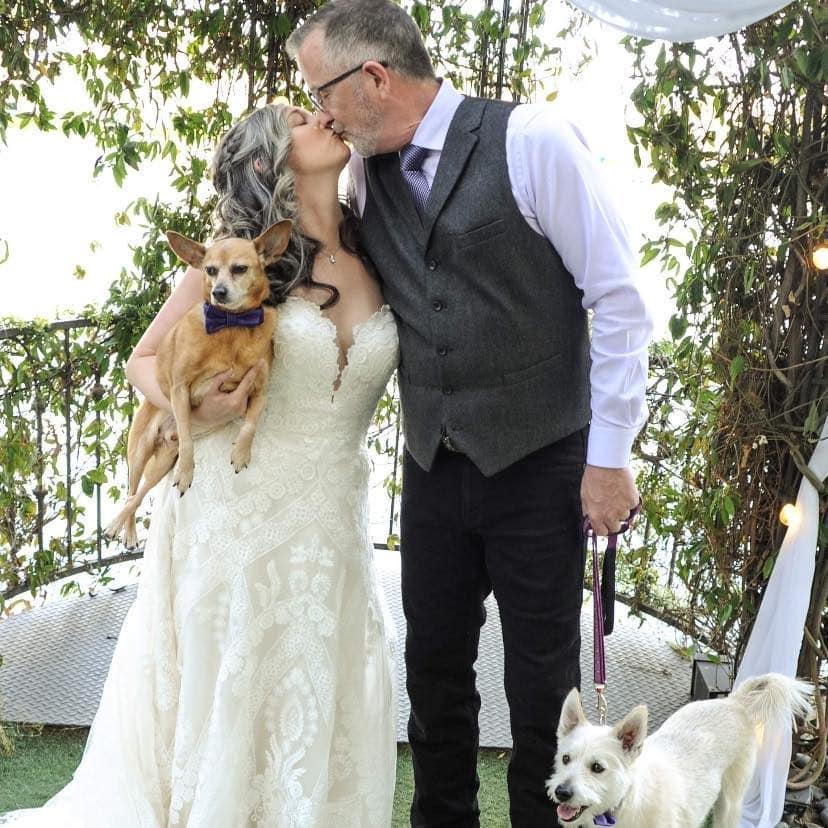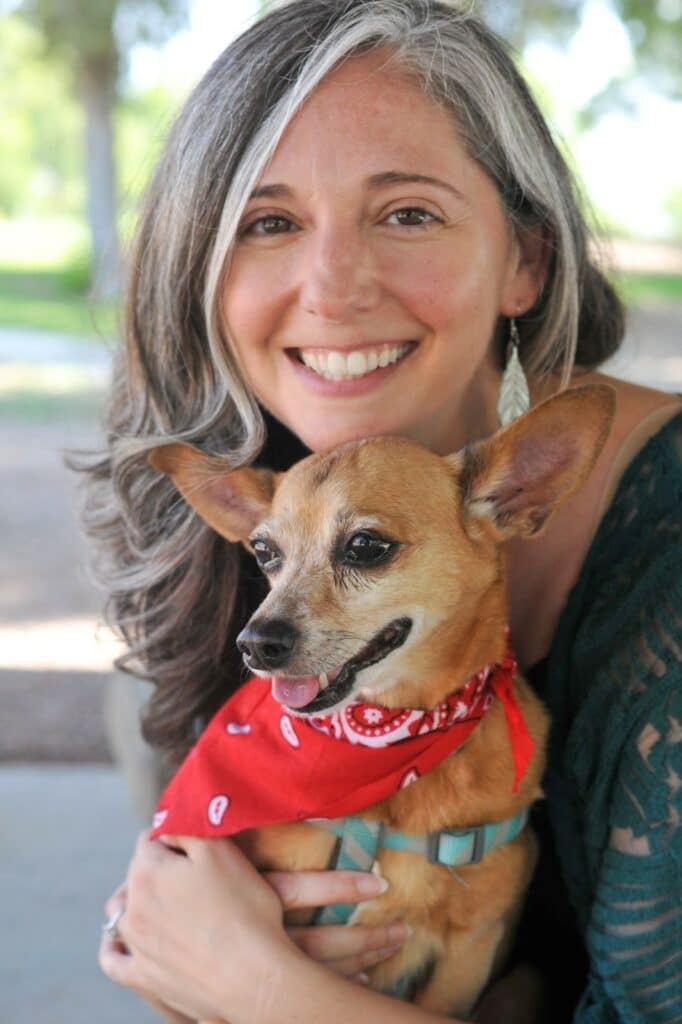Contents
Hello! Who are you?
Hey there! My name is Sheryl Green and I’ve been living in Las Vegas since 2008. I’ve got a wonderful husband named Tom, the 2 best dogs on the planet, Bodhi and Buddy, (it’s okay, your dogs are the best too), and more than 150 house plants.

I love to travel and spend time in nature. I’ve been doing yoga for 20+ years and can often be found with 45 lbs of dog (and a chew toy) on my yoga mat.
I’m an author, speaker, and animal advocate who is now dedicated to making the world a better place… one boundary at a time.
While the past few months have been very difficult (I lost my stepmom and my dad has advanced-stage dementia and had to be moved into a memory care facility), I would say I’m a pretty happy person. My sense of humor has saved me on more than one occasion!
What is your struggle and when did it start?
There have been two extremely difficult periods in my life. The first was back in July of 2008 when my (then) husband was arrested for soliciting a minor online. His arrest was just a few cameras short of a To Catch a Predator episode, and I knew instantly that my marriage (and the life I knew) was over.
I spent the next few months in a deep clinical depression. I left my job, moved from our 4 bedroom home in North Carolina to my parents’ spare bedroom in Las Vegas, and declared bankruptcy to get out from under the debt he had accrued. I knew absolutely no one, and I wasn’t in any condition to make friends.
Most days, I wasn’t in any condition to get out of bed. I didn’t consider committing suicide, but I certainly wouldn’t have been upset if something took me out.
One day, my parents came home to find me on the bathroom floor, curled up in the fetal position with tears streaming down my face.
My second challenging time came in October of 2021. I was working full-time for an animal rescue and running my own content writing business to keep a roof over my head and kibble in the dogs’ bowls.
I was averaging 16-18 hour days but no matter how hard I worked, I kept falling farther and farther behind… all while continuing to take on more client projects, agree to more responsibilities at the rescue, and accept more volunteer roles with other organizations.
I cried straight for two months. I was snapping at everyone. My performance (in every area) was suffering, and for the first time in more than 10 years, I felt myself slipping back into a depression.
How did this struggle make you feel at your worst moments?
One evening, I was running some errands for the rescue when I became mesmerized by the headlights of the oncoming cars. This thought popped into my head… if I just crossed the median, this could all be over in a second. That’s when I knew I had a serious happiness problem on my hands.
I do not have a poker face. On the contrary, I have giant muppet eyes that allow people to read every thought and every emotion that crosses my mind, the second it occurs. I remember when I was younger and wanted to look tough. I don’t think I cried in front of anyone until I was in my mid-twenties. But during my divorce and my meltdown, I certainly made up for that.
Everyone knew I was hurting, but no one knew how to help me. And I didn’t have the slightest idea what to tell them. I saw a therapist very briefly during this time and she asked me the most bizarre question…
“What do you need?”
I just stared at her for a few minutes as I processed this question. No one had ever asked me that before, and I’d certainly never asked myself that question. In fact, I spent every waking moment wondering what I needed to do for everyone else.
👉 Share your story: Help thousands of people around the world by sharing your own story. We would love to publish your interview and have a positive impact on the world together. Learn more here.
Was there a moment when you started to turn things around?
My bathroom floor and the oncoming traffic were definitely rock bottom moments for me, but they were also turning points. Laying on the tile, my stepmom gave me the best advice I’d ever been given (which I’d later corrupt). She said, “Go help someone else.”
I did. I got involved in animal rescue and dedicated my life to providing a voice for those who can’t speak. Working with animals helped me overcome depression. It gave me purpose, direction, and reason to be on this earth.
What I didn’t realize at the time (and trust me, if you gave me a time machine, I’d go and do it all again), was that it was a perfect breeding ground for disordered boundaries. A lifetime of people-pleasing and basing my self-worth culminated in the perfect storm. I wasn’t giving of myself anymore, I was giving up myself.
I emailed my boss and took the following month off to get my head right. I knew if I tried to power through it, I wouldn’t be around long to save anyone. I did some soul-searching during that month, but more importantly, I dove into learning everything I could about boundaries.
I discovered how unhealthy my life had been up to that point, and vowed to make a change.
By the 5th of the year, I was no longer working with the rescue. By the 29th, I’d started dating Tom. Ironically, if I hadn’t gone through what I went through, we never would’ve gotten together. I decided that boundaries were not only a lesson I needed to learn, but a lesson I needed to teach.
I stepped down from volunteer positions, protected my schedule, and got back to creating a healthy version of myself. Then… I started outlining my book You Had Me At No: How Setting Healthy Boundaries Helps Banish Burnout, Repair Relationships, and Save Your Sanity.
What steps did you take to overcome your struggle?
Depression sucks. There’s no way around that. You have no energy. The slightest thing makes you cry. You’re either not hungry or you eat everything in sight. You feel alone but you avoid being around anyone else. It’s rough. Thankfully, there’s always something we can do to feel better.
In the past, I would’ve said “Throw yourself into helping others.” The problem is, I now know that sometimes… that’s the issue. You’ve done so much of helping others that you haven’t taken care of yourself.
My new advice, identify the emotions beneath the depression. Are you overwhelmed? Are you anxious? Are you fearful? Depression is often called “anger turned inward.” So, why are you angry? Once you’ve identified the root emotion (and you may need a therapist to help), it’s time to figure out why it’s there.
Yes, there probably are purely chemical depressions that require medication to get your system right. However, in many situations, there’s actually something triggering depression.
Yes, go help someone else. It helped me get out of my own head for a bit and I loved saving animals. It made me feel warm and fuzzy and accomplished. But, if you’ve swung too far in the other direction and spent too much time helping others, now you need to focus on yourself.
Boundary work is essential for this. It helps us identify where others end and we begin. It helps us understand what we want, what we need, and what we will and will not put up with from others. And, it helps us filter out other people’s priorities so we can focus on our own.
To be clear, I’m not advocating for telling everyone to scratch. We are on this planet to help one another, we just have to make sure we take care of ourselves so we are around long enough to make a difference.
Have you shared any of this with people around you in real life?
I’m a firm believer that once we pass over a chasm of suckage, it’s our responsibility to hold out our hand and help the next person. I’ve shared my story with friends, clients, interviewers, and in books and on stage. If my pain helps lessen someone else’s, it was all worth it.
Is it scary to admit that I struggle with depression and anxiety? Sure. There’s still a great deal of stigma around mental health issues. However, I’ve found that when I share, it gives other people permission to share their own stories and ask questions.
“Be curious, not judgmental” as Ted Lasso says.

If you could give a single piece of advice to someone else that struggles, what would that be?
Show yourself the same level of kindness and compassion you’ve reserved for others your entire life. We are so damn hard on ourselves and we say things to ourselves, that we wouldn’t say to our worst enemies.
Give yourself some grace. You are a work in progress (we all are), and there’s no need to wake up tomorrow as a perfect version of yourself. Just aim for a little better each day and if you don’t reach that goal one day or one week, give yourself some grace.
Oh, and snuggle an animal!

What have been the most influential books, podcasts, YouTube channels, or other resources for you?
I feel like I’ve read just about every personal development book there is. I took a little bit from each, but I keep going back to these four:
- You Are a Badass by Jen Sincero: I loved her writing style and the simplicity of what she was sharing
- Four Thousand Weeks by Oliver Burkeman: Knowing that you’ll have (roughly) 4,000 weeks on this planet really puts things in perspective.
- The Big Leap: The concept of “upper limiting” yourself (basically sabotaging something because you don’t think you deserve it), changed my life.
- It may sound silly, but I go back and read my very first book: Surviving to Thriving: How to Overcome Setbacks and Rock Your Life, every year. Even once I’ve learned (and taught) a lesson, I need a reminder!
Where can we go to learn more about you?
You can read more about my books and speaking on my website. You can also follow me on Instagram @sherylsgreenspeaks and LinkedIn.
Want more interviews?
Continue reading our inspiring case studies and learn how to overcome mental health struggles in a positive way!
Want to help others with your story? We would love to publish your interview and have a positive impact on the world together. Learn more here.

